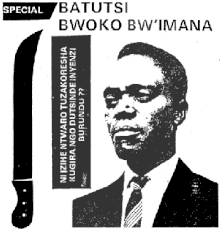Kangura

The cover of the November 1991 issue of Kangura. The title states, "Tutsi: Race of God", while the text to the right of the machete states, "Which weapons are we going to use to beat the cockroaches for good?". The man pictured is the second president of the First Republic, Grégoire Kayibanda, who made Hutu the governing ethnicity after the 1959 massacres.
|
|
| Editor | Hassan Ngeze |
|---|---|
| Categories | Political, Propaganda |
| Frequency | Bimonthly |
| First issue | 1990 |
| Final issue | 6 April 1994 |
| Country | Rwanda |
| Based in | Gisenyi |
| Language | French and Kinyarwanda |
Kangura was a Kinyarwanda- and French-language magazine in Rwanda that served to stoke ethnic hatred in the run-up to the Rwandan Genocide. The magazine was established in 1990, following the invasion of the rebel Rwandan Patriotic Front (RPF), and continued publishing up to the genocide. Sponsored by the dominant MRND party and edited by founder Hassan Ngeze, the magazine was a response to the RPF-sponsored Kanguka, adopting a similar informal style. "Kangura" was a Rwandan word meaning "wake others up", as opposed to "Kanguka", which meant "wake up". The journal was based in Gisenyi.
The magazine was the print equivalent to the later-established Radio Télévision Libre des Mille Collines (RTLM), publishing articles harshly critical of the RPF and of Tutsis generally. Its sensationalist news was passed by word-of-mouth through the largely illiterate population. Copies of Kangura were read in public meetings and, as the genocide approached, during Interahamwe militia rallies.
The journal was financed by military officers, MRND members and an intelligence agency of the government. Supporters included Lt.-Col. Anatole Nsengiyumva and Protais Zigiranyirazo, both later charged by the International Criminal Tribunal for Rwanda. Two language editions were published twice a month in batches of 1,500 to 3,000 copies. Some of the early editions were published on government printing presses. Due to the magazine's close ties with the government, it came to be viewed as a vehicle for the government of President Juvénal Habyarimana to test ideas, though Kangura did not hesitate to criticize the president over perceived concessions made during the negotiations in Arusha with the rebel Rwandan Patriotic Front (RPF).
...
Wikipedia
